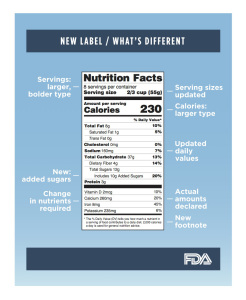FDA Decides To Delay New Nutrition Labels Until Some Vague Point In The Future Image courtesy of Dan Domme
Only weeks after food industry lobbyists asked the Food and Drug Administration to delay the starting date for revised Nutrition Facts labels, their wish has been granted. The FDA has announced it plans to kick this can down the road by extending these deadlines — possibly by as much as three years.
The FDA began working on its overhaul of the nutrition labels — the first in two decades — in 2014 and finalized these new labels in May 2016.
The agency then set a first compliance deadline of July 26, 2018 (for larger manufacturers) and a later deadline of July 2019 for the many smaller packaged foods businesses with annual sales of less than $10 million.
In April, the food industry made its case to the FDA that these labels should be pushed back even further — to May 2021.
 In an April letter [PDF] to new Health and Human Services Secretary Tom Price, executives from the Grocery Manufacturers Association and various other food industry trade and lobbying groups say that while they remain committed to implementing the new rules in order to provide customers with “clear information to help them make healthy choices,” but they think this can be accomplished with “far less complexity and cost.”
In an April letter [PDF] to new Health and Human Services Secretary Tom Price, executives from the Grocery Manufacturers Association and various other food industry trade and lobbying groups say that while they remain committed to implementing the new rules in order to provide customers with “clear information to help them make healthy choices,” but they think this can be accomplished with “far less complexity and cost.”
The groups claimed that “additional time will avoid billions of dollars in wasteful spending on duplicative relabeling schemes,” and allow coordination with another planned label update for products that contain genetically modified ingredients.
The FDA said in an update Tuesday that as a result of feedback from industry groups, and after careful consideration, it would extend the compliance deadline.
Details of the extension, including a specific implementation date, will be provided through a Federal Register Notice, the FDA said.
Still, any additional time provided through the extension is meant to “provide manufacturers covered by the rule with necessary guidance from FDA, and would help them be able to complete and print updated nutrition facts panels for their products before they are expected to be in compliance.”
Additionally, the extended compliance dates are intended to give the industry more time and decrease costs, as well as minimize the transition period between the old and new versions of the label in the marketplace.
Unsurprisingly, the FDA’s decision to extend the compliance date was applauded by the Big Food groups.
Grocery Manufacturers Association called the move a “common-sense” decision that will reduce confusion and costs for consumers.
“But the fast-approaching compliance deadline was virtually impossible to meet without the needed final guidance documents from FDA,” Pamela G. Bailey, GMA’s president and CEO, said in a statement. “FDA’s extension is both reasonable and practical.”
The public health advocates at the Center for Science in the Public Interest — a group that has long pushed for improvements to nutrition labels — argue that this delay is a disservice to consumers.
“As with its delay of menu labeling, the FDA will end up denying consumers critical information they need to make healthy food choices in a timely manner and will throw the food industry into disarray,” Jim O’Hara, CSPI director of health promotion policy, said in a statement.
Despite the extended deadline, CPSI notes that some companies have recognized that consumers want the new information and are already putting updated labels on products.
Want more consumer news? Visit our parent organization, Consumer Reports, for the latest on scams, recalls, and other consumer issues.

